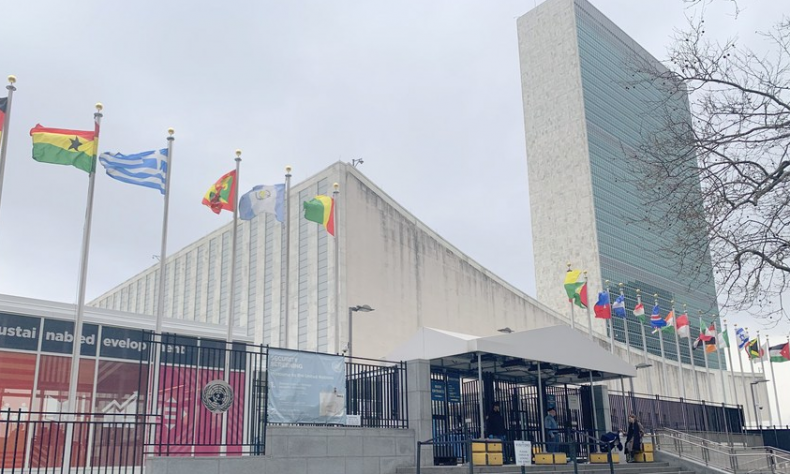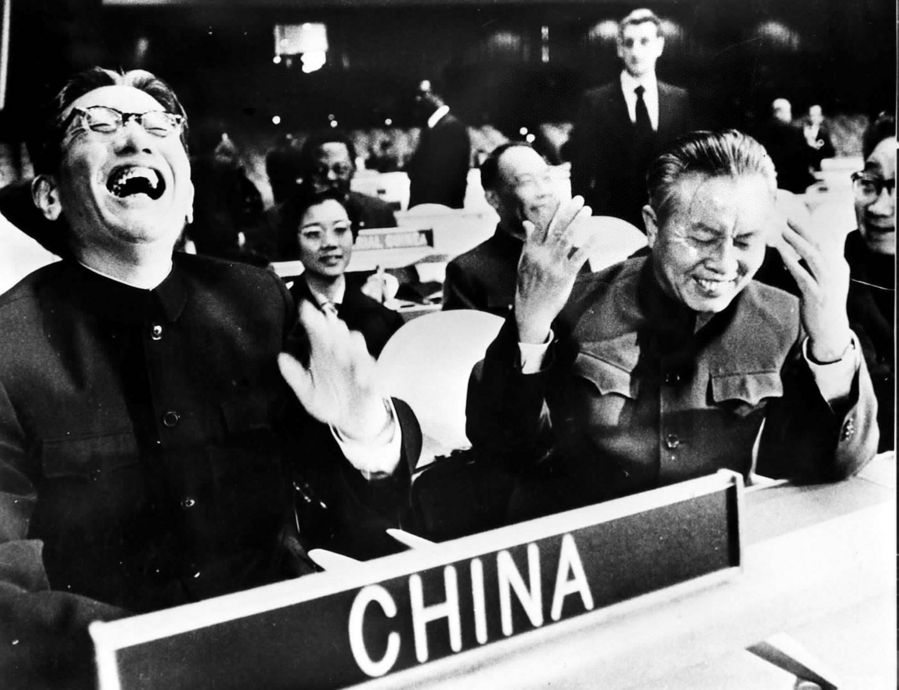Advancing the Noble Cause of the UN

China’s principled advocacy for a community with a shared future for all mankind, underwritten by common and inclusive development, collective security and universal peace, solicits global goodwill across political and ideological divide to safeguard and preserve mankind’s common home, Earth.
Despite the fact that China is one of the founding countries of the United Nations (UN), the People’s Republic of China founded in 1949 was denied a seat at the global body, although it had fought tenaciously in the Eastern corridor to ward off and defeat Japanese fascist and militarist aggression in World War II. The alarm bell of a free people in the East which the People’s Republic of China represented was obviously too much to bear for the Western imperialist powers.
The United States deployed every trick in the book to prevent China from gaining its legitimate seat at the UN. Having managed to stall the question of China’s representation from the 1950s under the fabrication of the so-called China’s “aggression in Korea,” the United States pulled yet another trick at the 16th Session of the UN General Assembly in 1961, which had adopted the agenda item of the representation of China by railroading a resolution through the assembly to the effect that the restoration of Chinese representation was an “important question,” requiring a two-thirds majority vote for a decision.
However, “important question” as prescribed in the UN Charter only relates to the admission of a new member, the suspension of the rights and privileges of membership or the expulsion of a member, and therefore, did not apply to the restoration of China’s legitimate seat to the UN. But the United States played the game to maintain the representation of its proxy, the Chiang Ka-shek clique, in the world body.
However, at the 25th Session of the UN General Assembly in 1970, it became clear that more nations from Asia, Africa and Latin America were winning their national independence and becoming members of the UN; it dawned on the United States that it could no longer perpetuate its tricks to hold back China from regaining its lawful seat. In desperation, it sponsored along with Japan a draft resolution on the so-called “dual representation,” which conceded the right of the People’s Republic of China to resume its lawful seat at the UN, but at the same time, Chiang Kai-shek clique was not deprived of it representation.

Immediately, China’s Ministry of Foreign Affairs denounced the plot in the strongest terms, making it clear that China would never tolerate any situation of “Two Chinas” or “One China, One Taiwan” in the UN, and insisting that the restoration of China’s legitimate seat at the UN and the expulsion of Chiang Kai-shek clique were two sides of the same coin. Finally, on October 25, 1971, the 26th Session of UN General Assembly voted down the draft resolution on the so-called “important question,” bringing to an end the procedural obstacle the United States had previously created to stall China’s representation. Thereafter, a resolution tabled by Algeria, Albania and 21 other countries called for the restoration of all legitimate rights of the People’s Republic of China in the UN and the expulsion of the representatives of the Chiang Kai-shek clique from the UN and all the organs affiliated to it.
The famous UN Assembly Resolution 2758 was adopted with overwhelming majority votes of 76 votes to 35, with 17 abstentions.
The representative of Burundi on behalf of the African members said that the restoration of China’s lawful seat in the UN appeared to be “the dawn of a new international balance.”
Twenty-six African countries were among the 76 nations that voted to restore China’s legitimate seat at the UN, and, in appreciation, Chairman Mao Zedong was reported to have said that “it was our African brothers that carried us back to the UN.” China’s epic journey to the UN is historically significant for the principled struggles along the way but even more significant for China’s persistent endeavors at the UN.

China’s involvement in the UN process has reinforced the centrality of multilateralism as a framework for inclusive and participatory international system. China has actively participated in the peacekeeping operations, reinforcing the key pillar of the UN in ensuring collective security and peace. China has done more than any other permanent members of the UN Security Council in contributing to the UN peacekeeping operations across the world. At the 76th Session of the UN General Assembly in September, Chinese President Xi Jinping pledged to “continue our active efforts to take China’s cooperation with the UN to a new level and make new and greater contributions to advancing the noble cause of the UN.”
To bring practical expression to the UN spirit of international cooperation, China has launched the Belt and Road Initiative, a network of connectivity featuring infrastructure, financial integration and people-to-people contacts. The Belt and Road framework of international cooperation has delivered solid infrastructure connectivity between countries and regions, and even within them. Through the Belt and Road Initiative and its practical and tangible network of connectivity running across many countries and regions, the UN spirit of international cooperation and solidarity is diffusing among various peoples and giving ownership of the UN process not only to states but also to people.

China’s foreign policy has been and is still guided by the Five Principles of Peaceful Coexistence, which include mutual respect for sovereignty and territorial integrity, mutual non-aggression, non-interference in each other’s internal affairs, equality and mutual benefit, and peaceful coexistence. These are also at the center of the UN system. China reinforces the credibility and integrity of the UN by strict adherence and practice of the Five Principles of Peaceful Coexistence.
The consequences of the disaster of hegemonic and unilateral adventures outside the UN system and international law as seen recently in Afghanistan and previously in Libya, Iraq and Syria brings back the horrific image of “untold sorrows,” which the UN pledged in its founding charter to forestall and prevent.
China’s principled advocacy for a community with a shared future for all mankind, underwritten by common and inclusive development, collective security and universal peace, solicits global goodwill across political and ideological divide to safeguard and preserve mankind’s common home, Earth. In his statement to the UN in September, Xi noted that “the world is once again at a historical crossroads,” but exhorted the world to “bolster confidence and jointly address global threats and challenges, and work together to build a community with a shared future for mankind and a better world for all.”
This clarion call is at the very heart of the UN and its continued relevance, integrity and credibility will depend on how it sustains its original mission while engaging with the reality of a rapidly changing world.
The writer is the director of the Center for China Studies in Abuja, Nigeria.
 Facebook
Facebook
 Twitter
Twitter
 Linkedin
Linkedin
 Google +
Google +










